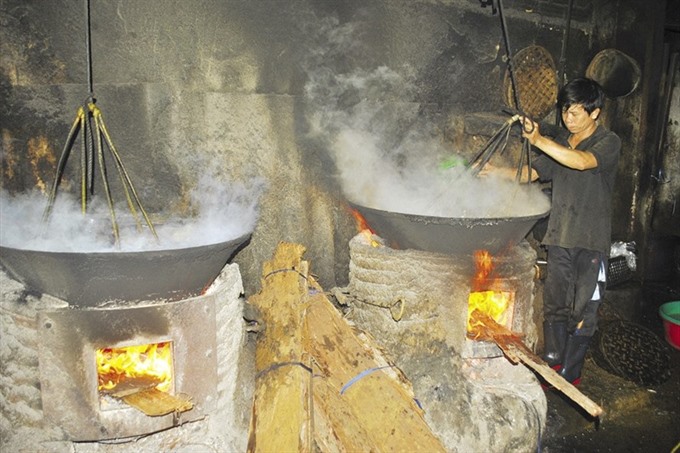 Society
Society

At 1am, when most people are sleeping, a small corner near the Quy Nhơn seaport in Hải Cảng Ward, Quy Nhơn City in the central province of Bình Định, is bustling.
 |
| Farmers in Quy Nhơn City work hard all day in fish steaming workshop. — Photo laodong.vn |
BÌNH ĐỊNH — At 1am, when most people are sleeping, a small corner near the Quy Nhơn Seaport in Hải Cảng Ward, Quy Nhơn City in the central province of Bình Định, is bustling.
Ships arrive with their holds full of fish and shrimps and a distinct fishy smell.
This smell is familiar for people who steam fish. They live with, eat with, sleep with and reek of the fishy smell.
Lots of fished is steamed after being caught as a preliminary process before being sold.
The fish steaming workshop of Nguyễn Thị Chua, 63, is in a small and long alley. The closer one gets to the workshop, the stronger the fishy smell becomes.
The workshop is about 30sq.m and is full with different kinds of fish such as anchovy, scad, tuna and cuttlefish. Huge steaming stoves are placed on high heat cookers. The smell of fish and stove mixing together is a challenge for anyone coming here for the first time.
Despite the bad smell, female and male workers work hard. They talk joyfully as they do not care about the bad smell.
“Doing the work, people must be good at bearing the strong smell. Many people often joke that people doing the job are earning money with their noses, not their hands,” said Chua.
Many people have asked Chua to hire them, but after only a few days, they quit because they cannot stand the smell.
“The job chooses the workers, the workers don’t choose the job,” said Chua.
No husband
There are more than 10 fish steaming workshops near the Quy Nhơn seaport, and most of the women there are not married.
Võ Thị Mạnh, more than 60 years old, has steamed fish for more than 40 years. When she was young she did not get married and neither have her four younger sisters.
Mạnh’s mother died when she was delivering a child. Mạnh, as the oldest child, had to help her father take care of eight younger sisters and brothers. At first, Mạnh was the only person in the family to steam fish. Then she guided her younger sisters and brothers into the trade.
Mạnh and her four younger sisters are now absorbed in the work and live together.
“I used to want to get married, but at that time I spent all time taking care of my younger siblings, and could not think about myself,” said Mạnh.
Võ Thị Phụng, 53, another woman in the area, was born in a poor family with three siblings. She has steamed fish since she was young. Now all of her siblings are married, but she is still single.
“I’m in the steaming workshop all day and do not know what love is, and no man has asked to marry me,” Phụng said.
But in some cases, the bad smell brings people together.
The couple Nguyễn Thị Hiền, 37 and Cáp Văn Đĩnh, 43, is an example.
Hiền is the third child in a family of fish steamers. She has done the job since she was small. More than 10 years ago, Đĩnh often went to Hiền’s house to take steamed fish for transport to markets. They have loved each other since then and now have two sons.
Every day, after steaming the fish, together they take the fish to markets in Tây Sơn District, which is about 50km from Quy Nhơn City.
“Seeing we are happy, many people joke that if we didn’t smell like fish, we wouldn’t have married each other,” said Hiền.
“A wife and husband doing the same job will understand each other more. I believe that if people love each other, they will also love the bad fishy smell,” she said.
Lê Văn Sơn, 47, and his wife also met amongst the odours. Earlier Sơn worked for fishing ships while his wife sold fish on the port. They became familiar with each other after many times of the ships returning to land.
On average, Sơn earns about VNĐ200,000 (US$8.8) per day, together with some more his wife earns from selling fish at the market, they have enough to bring up four children. Two of them are studying as students in HCM City while two others are in high school.
“The work is so hard. But we try to bring up the children and hope that their lives will be better,” he said. — VNS